Public Health Report: Addressing Health Inequality and Interventions
VerifiedAdded on 2020/10/22
|13
|4047
|357
Report
AI Summary
This report addresses the pressing issue of health inequality within the UK's public health landscape. It begins by outlining current public health concerns, with a particular focus on the rising prevalence of obesity and overweight, and explores the utilization of population data to identify key health determinants. The report delves into the factors contributing to these issues, including lifestyle choices and socioeconomic influences, and examines various interventions aimed at tackling obesity and overweight. Furthermore, it investigates strategies for reducing disease incidence in local communities, the role of statutory bodies, and the effectiveness of different health protection strategies. The report also compares the roles of healthcare professionals in disease prevention and control, highlighting challenges and providing reflections on promoting prevention within local communities. Overall, the report provides a detailed analysis of health inequality and public health challenges, offering insights into interventions and strategies.
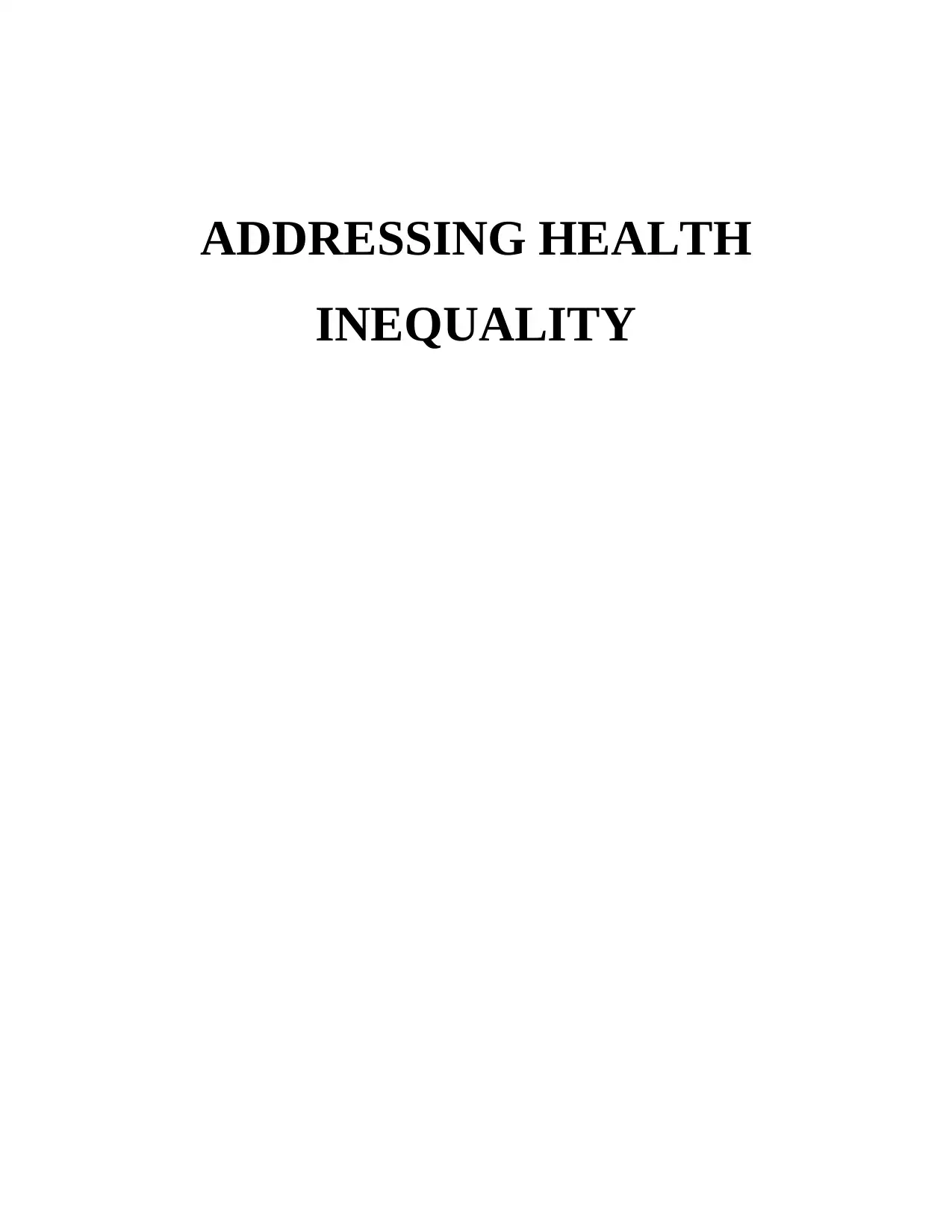
ADDRESSING HEALTH
INEQUALITY
INEQUALITY
Paraphrase This Document
Need a fresh take? Get an instant paraphrase of this document with our AI Paraphraser
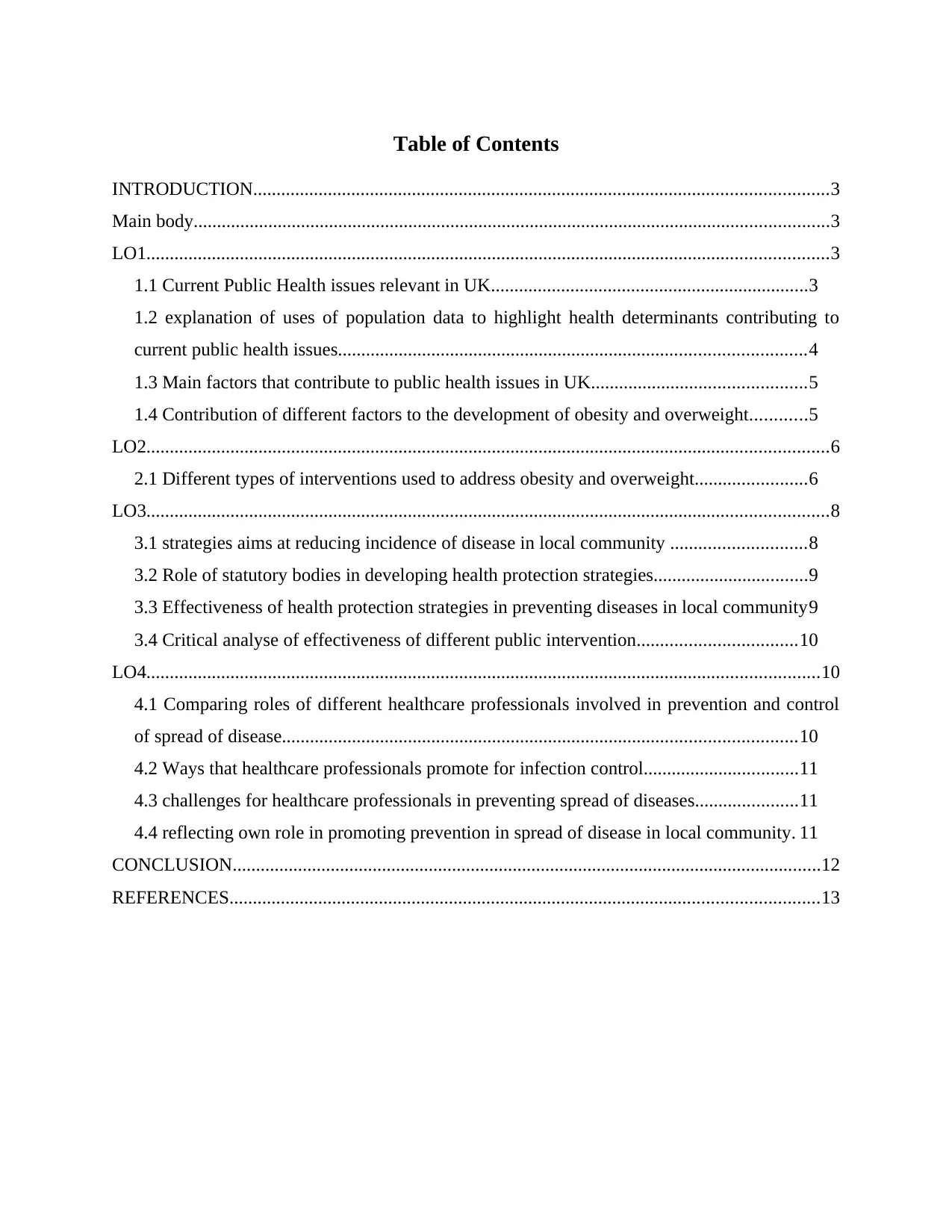
Table of Contents
INTRODUCTION...........................................................................................................................3
Main body........................................................................................................................................3
LO1..................................................................................................................................................3
1.1 Current Public Health issues relevant in UK....................................................................3
1.2 explanation of uses of population data to highlight health determinants contributing to
current public health issues....................................................................................................4
1.3 Main factors that contribute to public health issues in UK..............................................5
1.4 Contribution of different factors to the development of obesity and overweight............5
LO2..................................................................................................................................................6
2.1 Different types of interventions used to address obesity and overweight........................6
LO3..................................................................................................................................................8
3.1 strategies aims at reducing incidence of disease in local community .............................8
3.2 Role of statutory bodies in developing health protection strategies.................................9
3.3 Effectiveness of health protection strategies in preventing diseases in local community9
3.4 Critical analyse of effectiveness of different public intervention..................................10
LO4................................................................................................................................................10
4.1 Comparing roles of different healthcare professionals involved in prevention and control
of spread of disease..............................................................................................................10
4.2 Ways that healthcare professionals promote for infection control.................................11
4.3 challenges for healthcare professionals in preventing spread of diseases......................11
4.4 reflecting own role in promoting prevention in spread of disease in local community. 11
CONCLUSION..............................................................................................................................12
REFERENCES..............................................................................................................................13
INTRODUCTION...........................................................................................................................3
Main body........................................................................................................................................3
LO1..................................................................................................................................................3
1.1 Current Public Health issues relevant in UK....................................................................3
1.2 explanation of uses of population data to highlight health determinants contributing to
current public health issues....................................................................................................4
1.3 Main factors that contribute to public health issues in UK..............................................5
1.4 Contribution of different factors to the development of obesity and overweight............5
LO2..................................................................................................................................................6
2.1 Different types of interventions used to address obesity and overweight........................6
LO3..................................................................................................................................................8
3.1 strategies aims at reducing incidence of disease in local community .............................8
3.2 Role of statutory bodies in developing health protection strategies.................................9
3.3 Effectiveness of health protection strategies in preventing diseases in local community9
3.4 Critical analyse of effectiveness of different public intervention..................................10
LO4................................................................................................................................................10
4.1 Comparing roles of different healthcare professionals involved in prevention and control
of spread of disease..............................................................................................................10
4.2 Ways that healthcare professionals promote for infection control.................................11
4.3 challenges for healthcare professionals in preventing spread of diseases......................11
4.4 reflecting own role in promoting prevention in spread of disease in local community. 11
CONCLUSION..............................................................................................................................12
REFERENCES..............................................................................................................................13
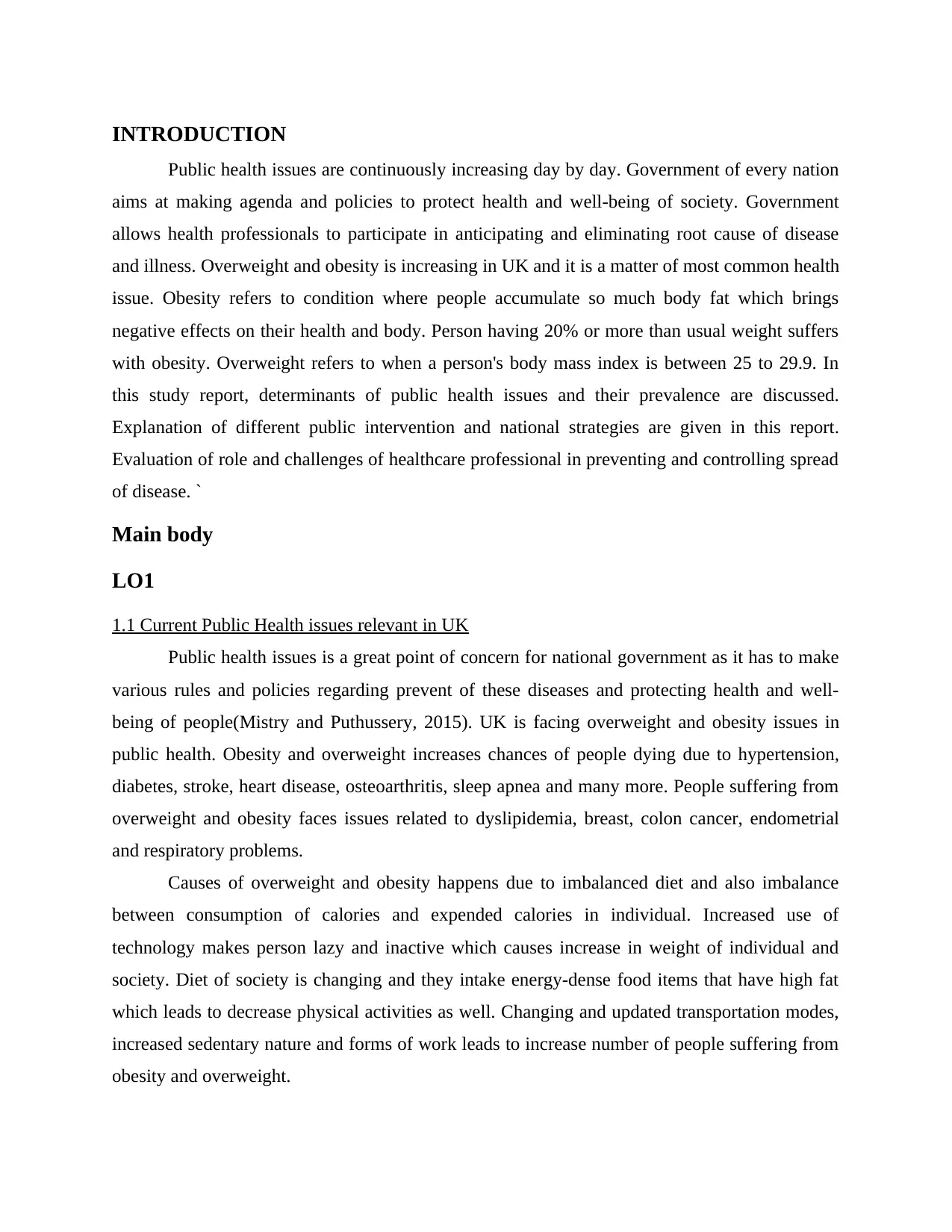
INTRODUCTION
Public health issues are continuously increasing day by day. Government of every nation
aims at making agenda and policies to protect health and well-being of society. Government
allows health professionals to participate in anticipating and eliminating root cause of disease
and illness. Overweight and obesity is increasing in UK and it is a matter of most common health
issue. Obesity refers to condition where people accumulate so much body fat which brings
negative effects on their health and body. Person having 20% or more than usual weight suffers
with obesity. Overweight refers to when a person's body mass index is between 25 to 29.9. In
this study report, determinants of public health issues and their prevalence are discussed.
Explanation of different public intervention and national strategies are given in this report.
Evaluation of role and challenges of healthcare professional in preventing and controlling spread
of disease. `
Main body
LO1
1.1 Current Public Health issues relevant in UK
Public health issues is a great point of concern for national government as it has to make
various rules and policies regarding prevent of these diseases and protecting health and well-
being of people(Mistry and Puthussery, 2015). UK is facing overweight and obesity issues in
public health. Obesity and overweight increases chances of people dying due to hypertension,
diabetes, stroke, heart disease, osteoarthritis, sleep apnea and many more. People suffering from
overweight and obesity faces issues related to dyslipidemia, breast, colon cancer, endometrial
and respiratory problems.
Causes of overweight and obesity happens due to imbalanced diet and also imbalance
between consumption of calories and expended calories in individual. Increased use of
technology makes person lazy and inactive which causes increase in weight of individual and
society. Diet of society is changing and they intake energy-dense food items that have high fat
which leads to decrease physical activities as well. Changing and updated transportation modes,
increased sedentary nature and forms of work leads to increase number of people suffering from
obesity and overweight.
Public health issues are continuously increasing day by day. Government of every nation
aims at making agenda and policies to protect health and well-being of society. Government
allows health professionals to participate in anticipating and eliminating root cause of disease
and illness. Overweight and obesity is increasing in UK and it is a matter of most common health
issue. Obesity refers to condition where people accumulate so much body fat which brings
negative effects on their health and body. Person having 20% or more than usual weight suffers
with obesity. Overweight refers to when a person's body mass index is between 25 to 29.9. In
this study report, determinants of public health issues and their prevalence are discussed.
Explanation of different public intervention and national strategies are given in this report.
Evaluation of role and challenges of healthcare professional in preventing and controlling spread
of disease. `
Main body
LO1
1.1 Current Public Health issues relevant in UK
Public health issues is a great point of concern for national government as it has to make
various rules and policies regarding prevent of these diseases and protecting health and well-
being of people(Mistry and Puthussery, 2015). UK is facing overweight and obesity issues in
public health. Obesity and overweight increases chances of people dying due to hypertension,
diabetes, stroke, heart disease, osteoarthritis, sleep apnea and many more. People suffering from
overweight and obesity faces issues related to dyslipidemia, breast, colon cancer, endometrial
and respiratory problems.
Causes of overweight and obesity happens due to imbalanced diet and also imbalance
between consumption of calories and expended calories in individual. Increased use of
technology makes person lazy and inactive which causes increase in weight of individual and
society. Diet of society is changing and they intake energy-dense food items that have high fat
which leads to decrease physical activities as well. Changing and updated transportation modes,
increased sedentary nature and forms of work leads to increase number of people suffering from
obesity and overweight.
⊘ This is a preview!⊘
Do you want full access?
Subscribe today to unlock all pages.

Trusted by 1+ million students worldwide
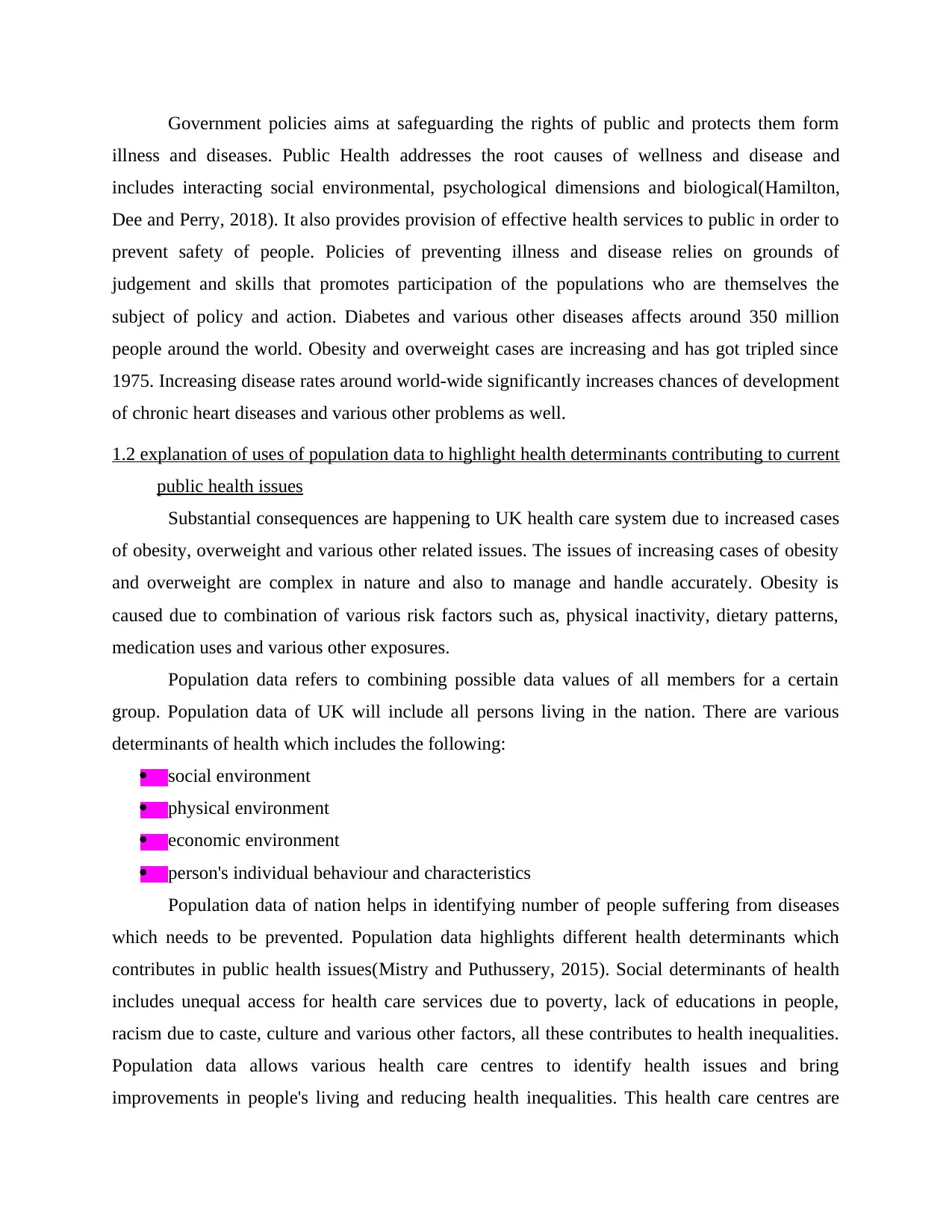
Government policies aims at safeguarding the rights of public and protects them form
illness and diseases. Public Health addresses the root causes of wellness and disease and
includes interacting social environmental, psychological dimensions and biological(Hamilton,
Dee and Perry, 2018). It also provides provision of effective health services to public in order to
prevent safety of people. Policies of preventing illness and disease relies on grounds of
judgement and skills that promotes participation of the populations who are themselves the
subject of policy and action. Diabetes and various other diseases affects around 350 million
people around the world. Obesity and overweight cases are increasing and has got tripled since
1975. Increasing disease rates around world-wide significantly increases chances of development
of chronic heart diseases and various other problems as well.
1.2 explanation of uses of population data to highlight health determinants contributing to current
public health issues
Substantial consequences are happening to UK health care system due to increased cases
of obesity, overweight and various other related issues. The issues of increasing cases of obesity
and overweight are complex in nature and also to manage and handle accurately. Obesity is
caused due to combination of various risk factors such as, physical inactivity, dietary patterns,
medication uses and various other exposures.
Population data refers to combining possible data values of all members for a certain
group. Population data of UK will include all persons living in the nation. There are various
determinants of health which includes the following:
social environment
physical environment
economic environment
person's individual behaviour and characteristics
Population data of nation helps in identifying number of people suffering from diseases
which needs to be prevented. Population data highlights different health determinants which
contributes in public health issues(Mistry and Puthussery, 2015). Social determinants of health
includes unequal access for health care services due to poverty, lack of educations in people,
racism due to caste, culture and various other factors, all these contributes to health inequalities.
Population data allows various health care centres to identify health issues and bring
improvements in people's living and reducing health inequalities. This health care centres are
illness and diseases. Public Health addresses the root causes of wellness and disease and
includes interacting social environmental, psychological dimensions and biological(Hamilton,
Dee and Perry, 2018). It also provides provision of effective health services to public in order to
prevent safety of people. Policies of preventing illness and disease relies on grounds of
judgement and skills that promotes participation of the populations who are themselves the
subject of policy and action. Diabetes and various other diseases affects around 350 million
people around the world. Obesity and overweight cases are increasing and has got tripled since
1975. Increasing disease rates around world-wide significantly increases chances of development
of chronic heart diseases and various other problems as well.
1.2 explanation of uses of population data to highlight health determinants contributing to current
public health issues
Substantial consequences are happening to UK health care system due to increased cases
of obesity, overweight and various other related issues. The issues of increasing cases of obesity
and overweight are complex in nature and also to manage and handle accurately. Obesity is
caused due to combination of various risk factors such as, physical inactivity, dietary patterns,
medication uses and various other exposures.
Population data refers to combining possible data values of all members for a certain
group. Population data of UK will include all persons living in the nation. There are various
determinants of health which includes the following:
social environment
physical environment
economic environment
person's individual behaviour and characteristics
Population data of nation helps in identifying number of people suffering from diseases
which needs to be prevented. Population data highlights different health determinants which
contributes in public health issues(Mistry and Puthussery, 2015). Social determinants of health
includes unequal access for health care services due to poverty, lack of educations in people,
racism due to caste, culture and various other factors, all these contributes to health inequalities.
Population data allows various health care centres to identify health issues and bring
improvements in people's living and reducing health inequalities. This health care centres are
Paraphrase This Document
Need a fresh take? Get an instant paraphrase of this document with our AI Paraphraser
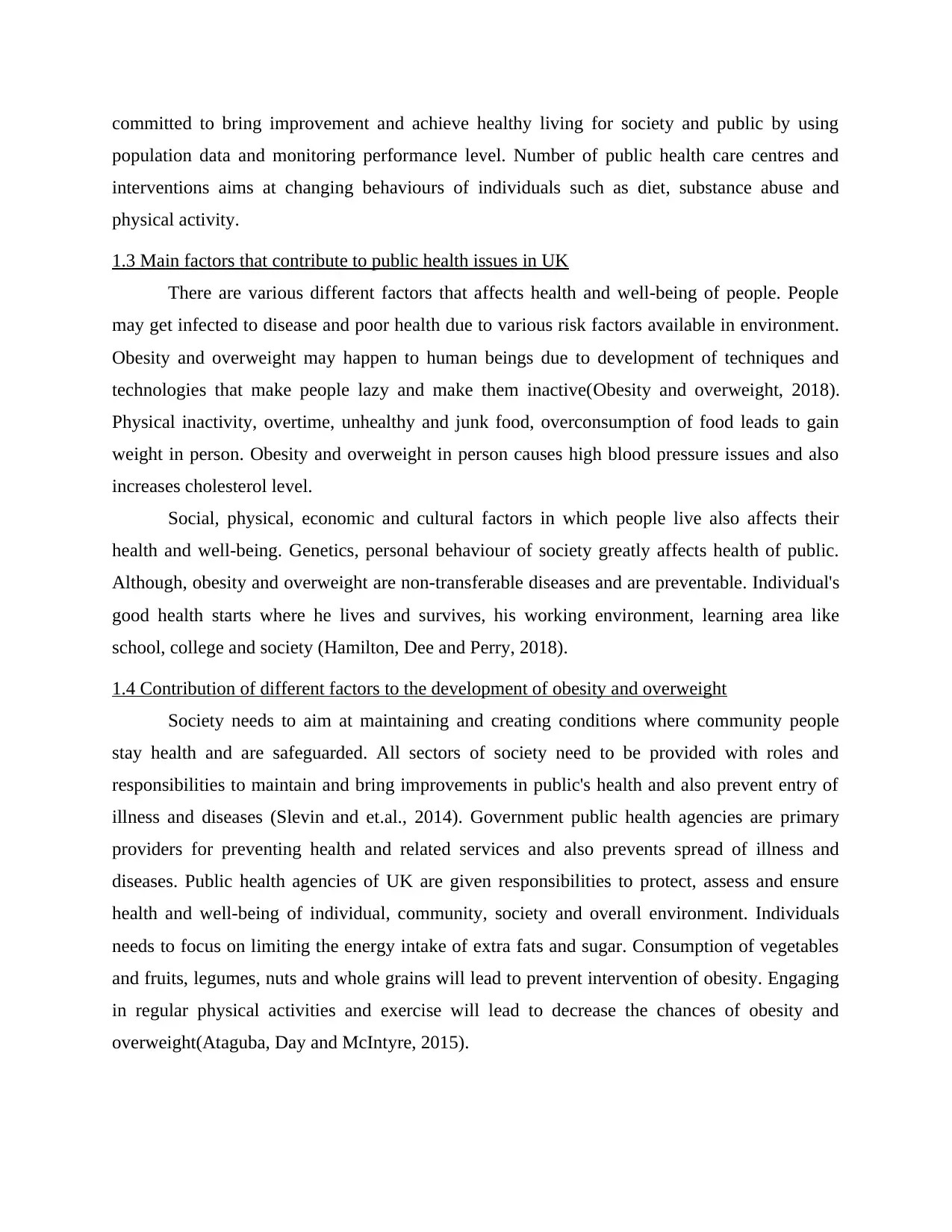
committed to bring improvement and achieve healthy living for society and public by using
population data and monitoring performance level. Number of public health care centres and
interventions aims at changing behaviours of individuals such as diet, substance abuse and
physical activity.
1.3 Main factors that contribute to public health issues in UK
There are various different factors that affects health and well-being of people. People
may get infected to disease and poor health due to various risk factors available in environment.
Obesity and overweight may happen to human beings due to development of techniques and
technologies that make people lazy and make them inactive(Obesity and overweight, 2018).
Physical inactivity, overtime, unhealthy and junk food, overconsumption of food leads to gain
weight in person. Obesity and overweight in person causes high blood pressure issues and also
increases cholesterol level.
Social, physical, economic and cultural factors in which people live also affects their
health and well-being. Genetics, personal behaviour of society greatly affects health of public.
Although, obesity and overweight are non-transferable diseases and are preventable. Individual's
good health starts where he lives and survives, his working environment, learning area like
school, college and society (Hamilton, Dee and Perry, 2018).
1.4 Contribution of different factors to the development of obesity and overweight
Society needs to aim at maintaining and creating conditions where community people
stay health and are safeguarded. All sectors of society need to be provided with roles and
responsibilities to maintain and bring improvements in public's health and also prevent entry of
illness and diseases (Slevin and et.al., 2014). Government public health agencies are primary
providers for preventing health and related services and also prevents spread of illness and
diseases. Public health agencies of UK are given responsibilities to protect, assess and ensure
health and well-being of individual, community, society and overall environment. Individuals
needs to focus on limiting the energy intake of extra fats and sugar. Consumption of vegetables
and fruits, legumes, nuts and whole grains will lead to prevent intervention of obesity. Engaging
in regular physical activities and exercise will lead to decrease the chances of obesity and
overweight(Ataguba, Day and McIntyre, 2015).
population data and monitoring performance level. Number of public health care centres and
interventions aims at changing behaviours of individuals such as diet, substance abuse and
physical activity.
1.3 Main factors that contribute to public health issues in UK
There are various different factors that affects health and well-being of people. People
may get infected to disease and poor health due to various risk factors available in environment.
Obesity and overweight may happen to human beings due to development of techniques and
technologies that make people lazy and make them inactive(Obesity and overweight, 2018).
Physical inactivity, overtime, unhealthy and junk food, overconsumption of food leads to gain
weight in person. Obesity and overweight in person causes high blood pressure issues and also
increases cholesterol level.
Social, physical, economic and cultural factors in which people live also affects their
health and well-being. Genetics, personal behaviour of society greatly affects health of public.
Although, obesity and overweight are non-transferable diseases and are preventable. Individual's
good health starts where he lives and survives, his working environment, learning area like
school, college and society (Hamilton, Dee and Perry, 2018).
1.4 Contribution of different factors to the development of obesity and overweight
Society needs to aim at maintaining and creating conditions where community people
stay health and are safeguarded. All sectors of society need to be provided with roles and
responsibilities to maintain and bring improvements in public's health and also prevent entry of
illness and diseases (Slevin and et.al., 2014). Government public health agencies are primary
providers for preventing health and related services and also prevents spread of illness and
diseases. Public health agencies of UK are given responsibilities to protect, assess and ensure
health and well-being of individual, community, society and overall environment. Individuals
needs to focus on limiting the energy intake of extra fats and sugar. Consumption of vegetables
and fruits, legumes, nuts and whole grains will lead to prevent intervention of obesity. Engaging
in regular physical activities and exercise will lead to decrease the chances of obesity and
overweight(Ataguba, Day and McIntyre, 2015).
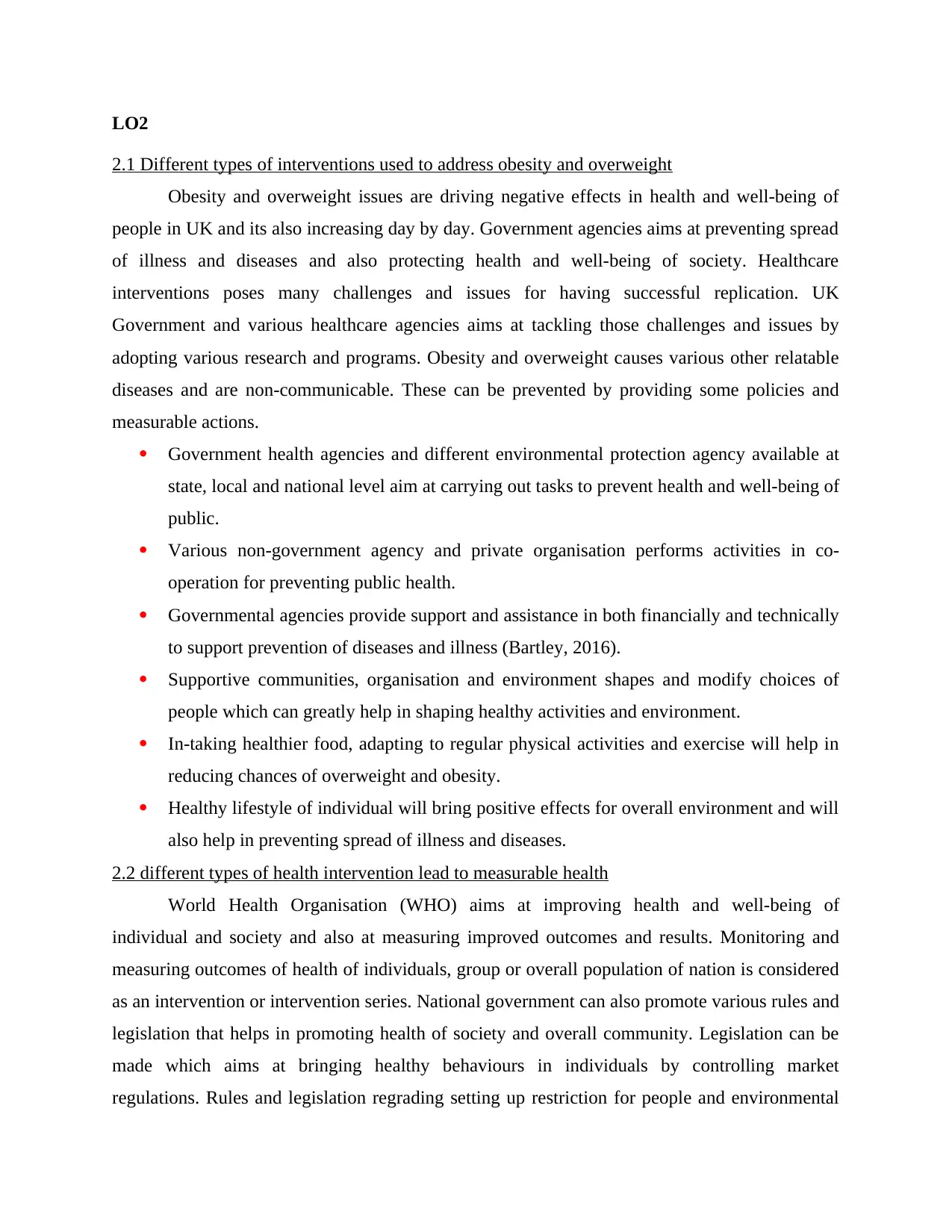
LO2
2.1 Different types of interventions used to address obesity and overweight
Obesity and overweight issues are driving negative effects in health and well-being of
people in UK and its also increasing day by day. Government agencies aims at preventing spread
of illness and diseases and also protecting health and well-being of society. Healthcare
interventions poses many challenges and issues for having successful replication. UK
Government and various healthcare agencies aims at tackling those challenges and issues by
adopting various research and programs. Obesity and overweight causes various other relatable
diseases and are non-communicable. These can be prevented by providing some policies and
measurable actions.
Government health agencies and different environmental protection agency available at
state, local and national level aim at carrying out tasks to prevent health and well-being of
public.
Various non-government agency and private organisation performs activities in co-
operation for preventing public health.
Governmental agencies provide support and assistance in both financially and technically
to support prevention of diseases and illness (Bartley, 2016).
Supportive communities, organisation and environment shapes and modify choices of
people which can greatly help in shaping healthy activities and environment.
In-taking healthier food, adapting to regular physical activities and exercise will help in
reducing chances of overweight and obesity.
Healthy lifestyle of individual will bring positive effects for overall environment and will
also help in preventing spread of illness and diseases.
2.2 different types of health intervention lead to measurable health
World Health Organisation (WHO) aims at improving health and well-being of
individual and society and also at measuring improved outcomes and results. Monitoring and
measuring outcomes of health of individuals, group or overall population of nation is considered
as an intervention or intervention series. National government can also promote various rules and
legislation that helps in promoting health of society and overall community. Legislation can be
made which aims at bringing healthy behaviours in individuals by controlling market
regulations. Rules and legislation regrading setting up restriction for people and environmental
2.1 Different types of interventions used to address obesity and overweight
Obesity and overweight issues are driving negative effects in health and well-being of
people in UK and its also increasing day by day. Government agencies aims at preventing spread
of illness and diseases and also protecting health and well-being of society. Healthcare
interventions poses many challenges and issues for having successful replication. UK
Government and various healthcare agencies aims at tackling those challenges and issues by
adopting various research and programs. Obesity and overweight causes various other relatable
diseases and are non-communicable. These can be prevented by providing some policies and
measurable actions.
Government health agencies and different environmental protection agency available at
state, local and national level aim at carrying out tasks to prevent health and well-being of
public.
Various non-government agency and private organisation performs activities in co-
operation for preventing public health.
Governmental agencies provide support and assistance in both financially and technically
to support prevention of diseases and illness (Bartley, 2016).
Supportive communities, organisation and environment shapes and modify choices of
people which can greatly help in shaping healthy activities and environment.
In-taking healthier food, adapting to regular physical activities and exercise will help in
reducing chances of overweight and obesity.
Healthy lifestyle of individual will bring positive effects for overall environment and will
also help in preventing spread of illness and diseases.
2.2 different types of health intervention lead to measurable health
World Health Organisation (WHO) aims at improving health and well-being of
individual and society and also at measuring improved outcomes and results. Monitoring and
measuring outcomes of health of individuals, group or overall population of nation is considered
as an intervention or intervention series. National government can also promote various rules and
legislation that helps in promoting health of society and overall community. Legislation can be
made which aims at bringing healthy behaviours in individuals by controlling market
regulations. Rules and legislation regrading setting up restriction for people and environmental
⊘ This is a preview!⊘
Do you want full access?
Subscribe today to unlock all pages.

Trusted by 1+ million students worldwide
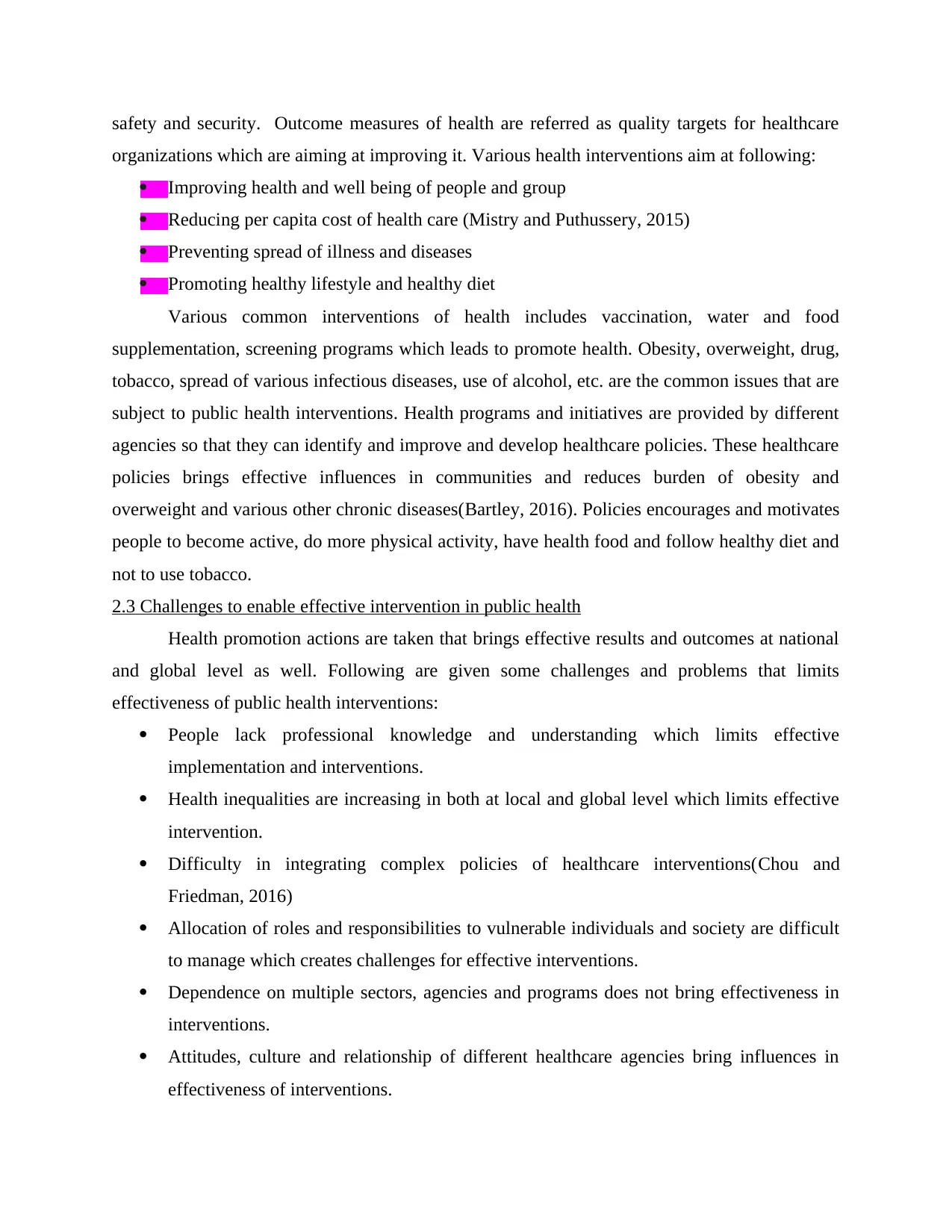
safety and security. Outcome measures of health are referred as quality targets for healthcare
organizations which are aiming at improving it. Various health interventions aim at following:
Improving health and well being of people and group
Reducing per capita cost of health care (Mistry and Puthussery, 2015)
Preventing spread of illness and diseases
Promoting healthy lifestyle and healthy diet
Various common interventions of health includes vaccination, water and food
supplementation, screening programs which leads to promote health. Obesity, overweight, drug,
tobacco, spread of various infectious diseases, use of alcohol, etc. are the common issues that are
subject to public health interventions. Health programs and initiatives are provided by different
agencies so that they can identify and improve and develop healthcare policies. These healthcare
policies brings effective influences in communities and reduces burden of obesity and
overweight and various other chronic diseases(Bartley, 2016). Policies encourages and motivates
people to become active, do more physical activity, have health food and follow healthy diet and
not to use tobacco.
2.3 Challenges to enable effective intervention in public health
Health promotion actions are taken that brings effective results and outcomes at national
and global level as well. Following are given some challenges and problems that limits
effectiveness of public health interventions:
People lack professional knowledge and understanding which limits effective
implementation and interventions.
Health inequalities are increasing in both at local and global level which limits effective
intervention.
Difficulty in integrating complex policies of healthcare interventions(Chou and
Friedman, 2016)
Allocation of roles and responsibilities to vulnerable individuals and society are difficult
to manage which creates challenges for effective interventions.
Dependence on multiple sectors, agencies and programs does not bring effectiveness in
interventions.
Attitudes, culture and relationship of different healthcare agencies bring influences in
effectiveness of interventions.
organizations which are aiming at improving it. Various health interventions aim at following:
Improving health and well being of people and group
Reducing per capita cost of health care (Mistry and Puthussery, 2015)
Preventing spread of illness and diseases
Promoting healthy lifestyle and healthy diet
Various common interventions of health includes vaccination, water and food
supplementation, screening programs which leads to promote health. Obesity, overweight, drug,
tobacco, spread of various infectious diseases, use of alcohol, etc. are the common issues that are
subject to public health interventions. Health programs and initiatives are provided by different
agencies so that they can identify and improve and develop healthcare policies. These healthcare
policies brings effective influences in communities and reduces burden of obesity and
overweight and various other chronic diseases(Bartley, 2016). Policies encourages and motivates
people to become active, do more physical activity, have health food and follow healthy diet and
not to use tobacco.
2.3 Challenges to enable effective intervention in public health
Health promotion actions are taken that brings effective results and outcomes at national
and global level as well. Following are given some challenges and problems that limits
effectiveness of public health interventions:
People lack professional knowledge and understanding which limits effective
implementation and interventions.
Health inequalities are increasing in both at local and global level which limits effective
intervention.
Difficulty in integrating complex policies of healthcare interventions(Chou and
Friedman, 2016)
Allocation of roles and responsibilities to vulnerable individuals and society are difficult
to manage which creates challenges for effective interventions.
Dependence on multiple sectors, agencies and programs does not bring effectiveness in
interventions.
Attitudes, culture and relationship of different healthcare agencies bring influences in
effectiveness of interventions.
Paraphrase This Document
Need a fresh take? Get an instant paraphrase of this document with our AI Paraphraser
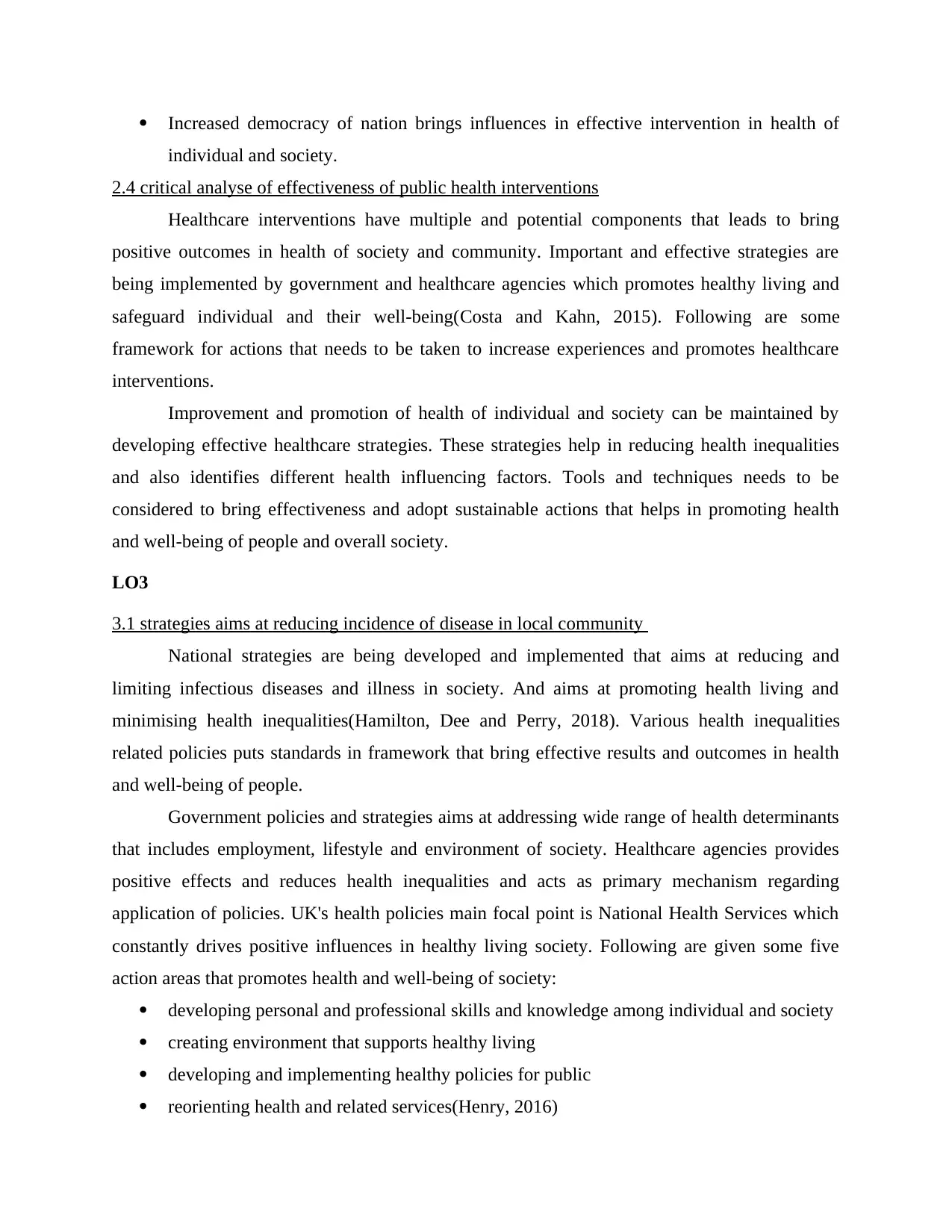
Increased democracy of nation brings influences in effective intervention in health of
individual and society.
2.4 critical analyse of effectiveness of public health interventions
Healthcare interventions have multiple and potential components that leads to bring
positive outcomes in health of society and community. Important and effective strategies are
being implemented by government and healthcare agencies which promotes healthy living and
safeguard individual and their well-being(Costa and Kahn, 2015). Following are some
framework for actions that needs to be taken to increase experiences and promotes healthcare
interventions.
Improvement and promotion of health of individual and society can be maintained by
developing effective healthcare strategies. These strategies help in reducing health inequalities
and also identifies different health influencing factors. Tools and techniques needs to be
considered to bring effectiveness and adopt sustainable actions that helps in promoting health
and well-being of people and overall society.
LO3
3.1 strategies aims at reducing incidence of disease in local community
National strategies are being developed and implemented that aims at reducing and
limiting infectious diseases and illness in society. And aims at promoting health living and
minimising health inequalities(Hamilton, Dee and Perry, 2018). Various health inequalities
related policies puts standards in framework that bring effective results and outcomes in health
and well-being of people.
Government policies and strategies aims at addressing wide range of health determinants
that includes employment, lifestyle and environment of society. Healthcare agencies provides
positive effects and reduces health inequalities and acts as primary mechanism regarding
application of policies. UK's health policies main focal point is National Health Services which
constantly drives positive influences in healthy living society. Following are given some five
action areas that promotes health and well-being of society:
developing personal and professional skills and knowledge among individual and society
creating environment that supports healthy living
developing and implementing healthy policies for public
reorienting health and related services(Henry, 2016)
individual and society.
2.4 critical analyse of effectiveness of public health interventions
Healthcare interventions have multiple and potential components that leads to bring
positive outcomes in health of society and community. Important and effective strategies are
being implemented by government and healthcare agencies which promotes healthy living and
safeguard individual and their well-being(Costa and Kahn, 2015). Following are some
framework for actions that needs to be taken to increase experiences and promotes healthcare
interventions.
Improvement and promotion of health of individual and society can be maintained by
developing effective healthcare strategies. These strategies help in reducing health inequalities
and also identifies different health influencing factors. Tools and techniques needs to be
considered to bring effectiveness and adopt sustainable actions that helps in promoting health
and well-being of people and overall society.
LO3
3.1 strategies aims at reducing incidence of disease in local community
National strategies are being developed and implemented that aims at reducing and
limiting infectious diseases and illness in society. And aims at promoting health living and
minimising health inequalities(Hamilton, Dee and Perry, 2018). Various health inequalities
related policies puts standards in framework that bring effective results and outcomes in health
and well-being of people.
Government policies and strategies aims at addressing wide range of health determinants
that includes employment, lifestyle and environment of society. Healthcare agencies provides
positive effects and reduces health inequalities and acts as primary mechanism regarding
application of policies. UK's health policies main focal point is National Health Services which
constantly drives positive influences in healthy living society. Following are given some five
action areas that promotes health and well-being of society:
developing personal and professional skills and knowledge among individual and society
creating environment that supports healthy living
developing and implementing healthy policies for public
reorienting health and related services(Henry, 2016)
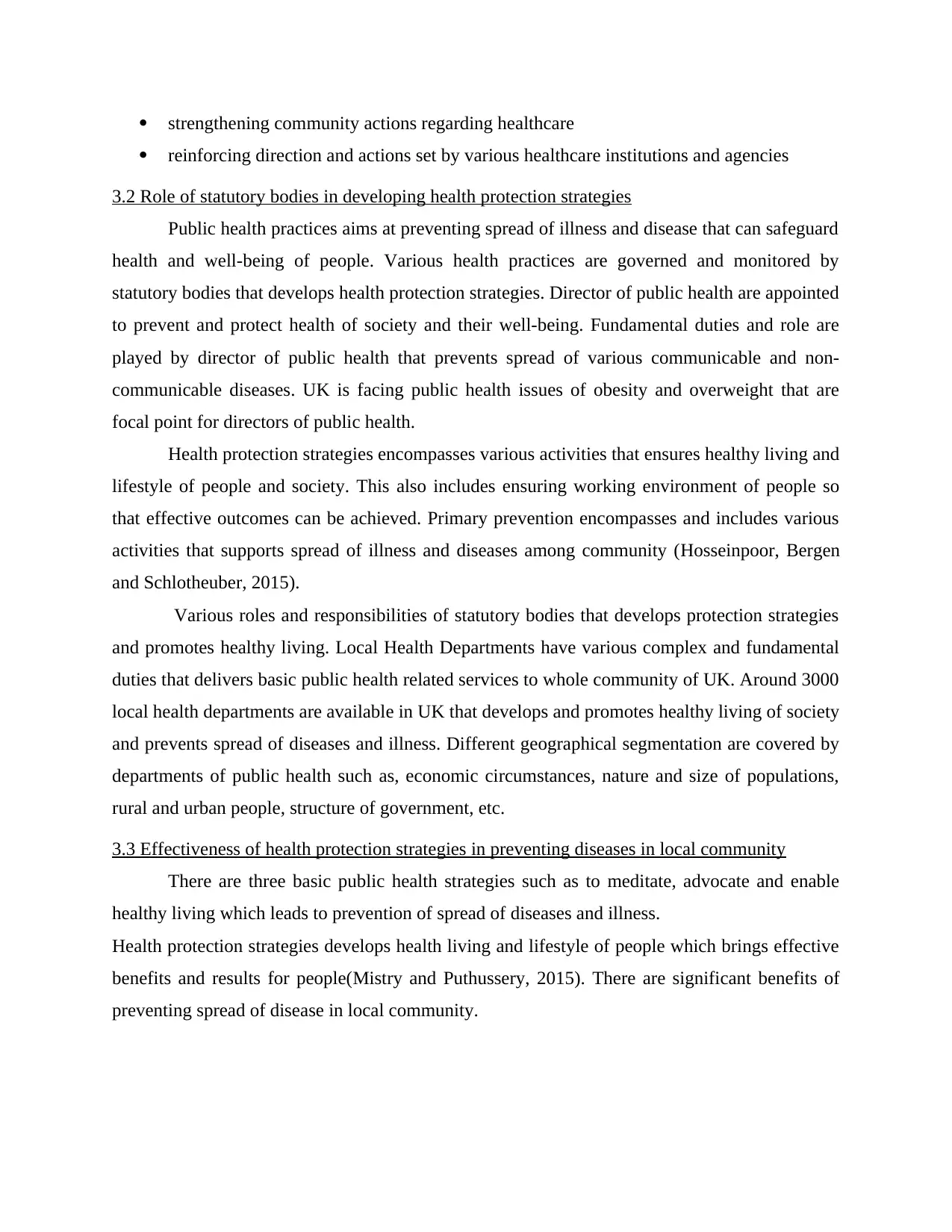
strengthening community actions regarding healthcare
reinforcing direction and actions set by various healthcare institutions and agencies
3.2 Role of statutory bodies in developing health protection strategies
Public health practices aims at preventing spread of illness and disease that can safeguard
health and well-being of people. Various health practices are governed and monitored by
statutory bodies that develops health protection strategies. Director of public health are appointed
to prevent and protect health of society and their well-being. Fundamental duties and role are
played by director of public health that prevents spread of various communicable and non-
communicable diseases. UK is facing public health issues of obesity and overweight that are
focal point for directors of public health.
Health protection strategies encompasses various activities that ensures healthy living and
lifestyle of people and society. This also includes ensuring working environment of people so
that effective outcomes can be achieved. Primary prevention encompasses and includes various
activities that supports spread of illness and diseases among community (Hosseinpoor, Bergen
and Schlotheuber, 2015).
Various roles and responsibilities of statutory bodies that develops protection strategies
and promotes healthy living. Local Health Departments have various complex and fundamental
duties that delivers basic public health related services to whole community of UK. Around 3000
local health departments are available in UK that develops and promotes healthy living of society
and prevents spread of diseases and illness. Different geographical segmentation are covered by
departments of public health such as, economic circumstances, nature and size of populations,
rural and urban people, structure of government, etc.
3.3 Effectiveness of health protection strategies in preventing diseases in local community
There are three basic public health strategies such as to meditate, advocate and enable
healthy living which leads to prevention of spread of diseases and illness.
Health protection strategies develops health living and lifestyle of people which brings effective
benefits and results for people(Mistry and Puthussery, 2015). There are significant benefits of
preventing spread of disease in local community.
reinforcing direction and actions set by various healthcare institutions and agencies
3.2 Role of statutory bodies in developing health protection strategies
Public health practices aims at preventing spread of illness and disease that can safeguard
health and well-being of people. Various health practices are governed and monitored by
statutory bodies that develops health protection strategies. Director of public health are appointed
to prevent and protect health of society and their well-being. Fundamental duties and role are
played by director of public health that prevents spread of various communicable and non-
communicable diseases. UK is facing public health issues of obesity and overweight that are
focal point for directors of public health.
Health protection strategies encompasses various activities that ensures healthy living and
lifestyle of people and society. This also includes ensuring working environment of people so
that effective outcomes can be achieved. Primary prevention encompasses and includes various
activities that supports spread of illness and diseases among community (Hosseinpoor, Bergen
and Schlotheuber, 2015).
Various roles and responsibilities of statutory bodies that develops protection strategies
and promotes healthy living. Local Health Departments have various complex and fundamental
duties that delivers basic public health related services to whole community of UK. Around 3000
local health departments are available in UK that develops and promotes healthy living of society
and prevents spread of diseases and illness. Different geographical segmentation are covered by
departments of public health such as, economic circumstances, nature and size of populations,
rural and urban people, structure of government, etc.
3.3 Effectiveness of health protection strategies in preventing diseases in local community
There are three basic public health strategies such as to meditate, advocate and enable
healthy living which leads to prevention of spread of diseases and illness.
Health protection strategies develops health living and lifestyle of people which brings effective
benefits and results for people(Mistry and Puthussery, 2015). There are significant benefits of
preventing spread of disease in local community.
⊘ This is a preview!⊘
Do you want full access?
Subscribe today to unlock all pages.

Trusted by 1+ million students worldwide
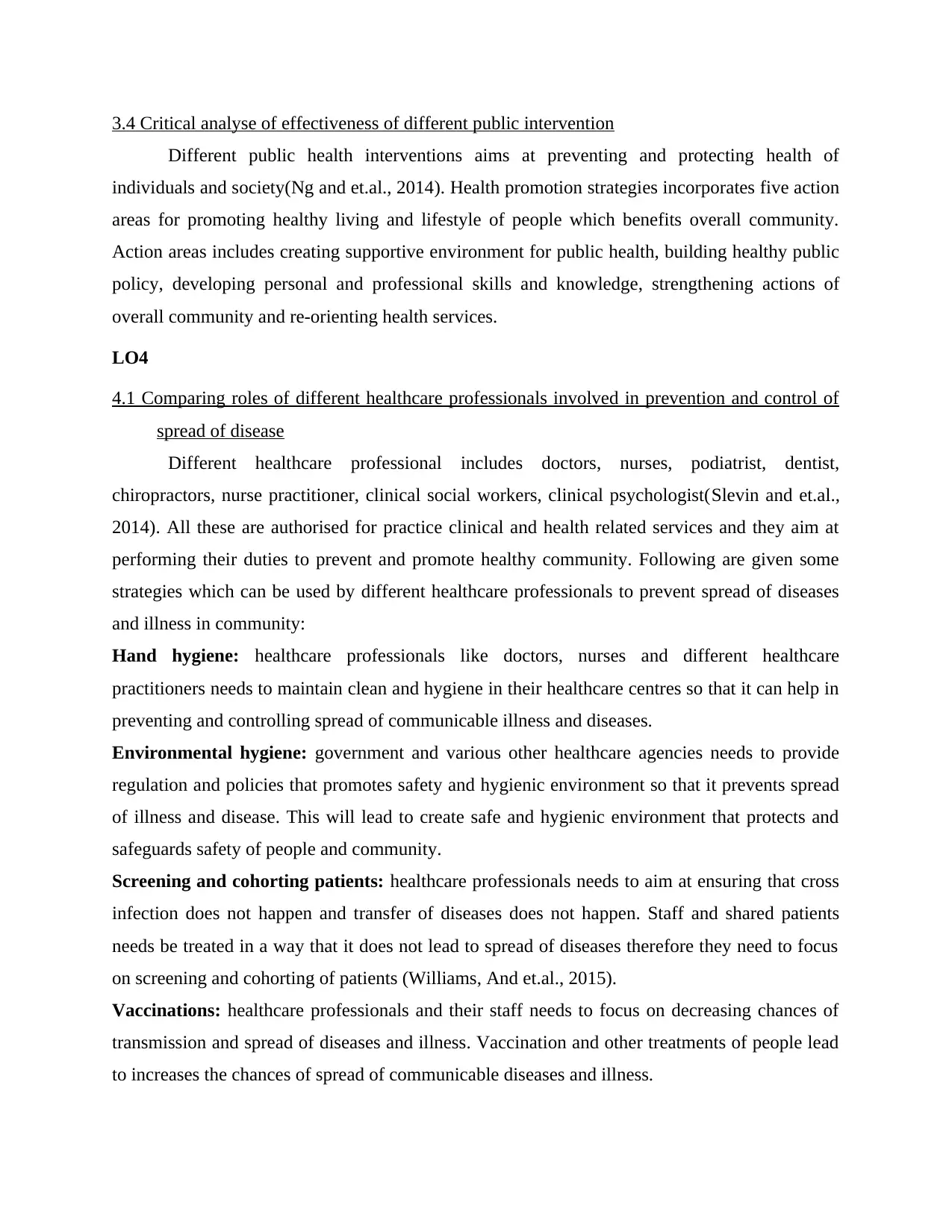
3.4 Critical analyse of effectiveness of different public intervention
Different public health interventions aims at preventing and protecting health of
individuals and society(Ng and et.al., 2014). Health promotion strategies incorporates five action
areas for promoting healthy living and lifestyle of people which benefits overall community.
Action areas includes creating supportive environment for public health, building healthy public
policy, developing personal and professional skills and knowledge, strengthening actions of
overall community and re-orienting health services.
LO4
4.1 Comparing roles of different healthcare professionals involved in prevention and control of
spread of disease
Different healthcare professional includes doctors, nurses, podiatrist, dentist,
chiropractors, nurse practitioner, clinical social workers, clinical psychologist(Slevin and et.al.,
2014). All these are authorised for practice clinical and health related services and they aim at
performing their duties to prevent and promote healthy community. Following are given some
strategies which can be used by different healthcare professionals to prevent spread of diseases
and illness in community:
Hand hygiene: healthcare professionals like doctors, nurses and different healthcare
practitioners needs to maintain clean and hygiene in their healthcare centres so that it can help in
preventing and controlling spread of communicable illness and diseases.
Environmental hygiene: government and various other healthcare agencies needs to provide
regulation and policies that promotes safety and hygienic environment so that it prevents spread
of illness and disease. This will lead to create safe and hygienic environment that protects and
safeguards safety of people and community.
Screening and cohorting patients: healthcare professionals needs to aim at ensuring that cross
infection does not happen and transfer of diseases does not happen. Staff and shared patients
needs be treated in a way that it does not lead to spread of diseases therefore they need to focus
on screening and cohorting of patients (Williams, And et.al., 2015).
Vaccinations: healthcare professionals and their staff needs to focus on decreasing chances of
transmission and spread of diseases and illness. Vaccination and other treatments of people lead
to increases the chances of spread of communicable diseases and illness.
Different public health interventions aims at preventing and protecting health of
individuals and society(Ng and et.al., 2014). Health promotion strategies incorporates five action
areas for promoting healthy living and lifestyle of people which benefits overall community.
Action areas includes creating supportive environment for public health, building healthy public
policy, developing personal and professional skills and knowledge, strengthening actions of
overall community and re-orienting health services.
LO4
4.1 Comparing roles of different healthcare professionals involved in prevention and control of
spread of disease
Different healthcare professional includes doctors, nurses, podiatrist, dentist,
chiropractors, nurse practitioner, clinical social workers, clinical psychologist(Slevin and et.al.,
2014). All these are authorised for practice clinical and health related services and they aim at
performing their duties to prevent and promote healthy community. Following are given some
strategies which can be used by different healthcare professionals to prevent spread of diseases
and illness in community:
Hand hygiene: healthcare professionals like doctors, nurses and different healthcare
practitioners needs to maintain clean and hygiene in their healthcare centres so that it can help in
preventing and controlling spread of communicable illness and diseases.
Environmental hygiene: government and various other healthcare agencies needs to provide
regulation and policies that promotes safety and hygienic environment so that it prevents spread
of illness and disease. This will lead to create safe and hygienic environment that protects and
safeguards safety of people and community.
Screening and cohorting patients: healthcare professionals needs to aim at ensuring that cross
infection does not happen and transfer of diseases does not happen. Staff and shared patients
needs be treated in a way that it does not lead to spread of diseases therefore they need to focus
on screening and cohorting of patients (Williams, And et.al., 2015).
Vaccinations: healthcare professionals and their staff needs to focus on decreasing chances of
transmission and spread of diseases and illness. Vaccination and other treatments of people lead
to increases the chances of spread of communicable diseases and illness.
Paraphrase This Document
Need a fresh take? Get an instant paraphrase of this document with our AI Paraphraser
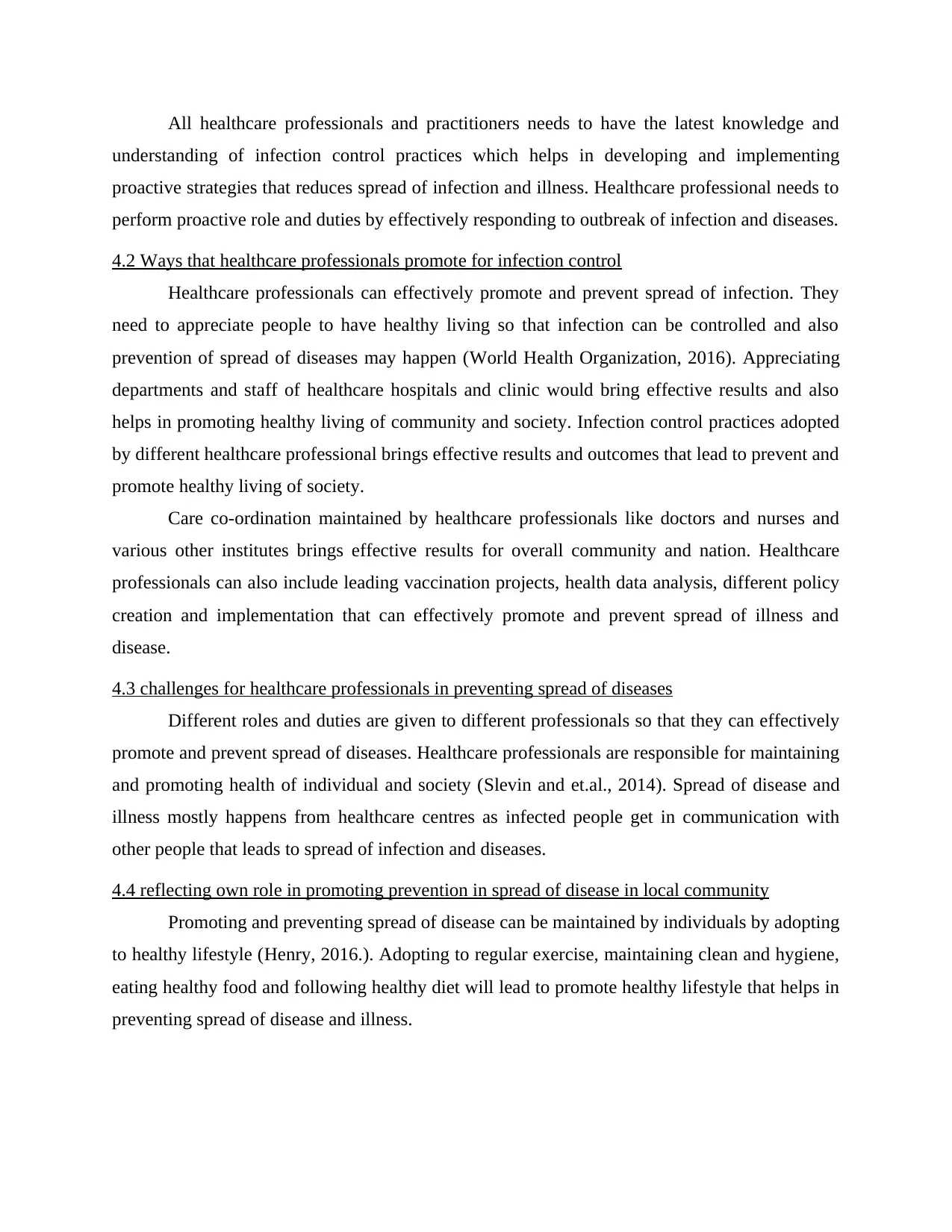
All healthcare professionals and practitioners needs to have the latest knowledge and
understanding of infection control practices which helps in developing and implementing
proactive strategies that reduces spread of infection and illness. Healthcare professional needs to
perform proactive role and duties by effectively responding to outbreak of infection and diseases.
4.2 Ways that healthcare professionals promote for infection control
Healthcare professionals can effectively promote and prevent spread of infection. They
need to appreciate people to have healthy living so that infection can be controlled and also
prevention of spread of diseases may happen (World Health Organization, 2016). Appreciating
departments and staff of healthcare hospitals and clinic would bring effective results and also
helps in promoting healthy living of community and society. Infection control practices adopted
by different healthcare professional brings effective results and outcomes that lead to prevent and
promote healthy living of society.
Care co-ordination maintained by healthcare professionals like doctors and nurses and
various other institutes brings effective results for overall community and nation. Healthcare
professionals can also include leading vaccination projects, health data analysis, different policy
creation and implementation that can effectively promote and prevent spread of illness and
disease.
4.3 challenges for healthcare professionals in preventing spread of diseases
Different roles and duties are given to different professionals so that they can effectively
promote and prevent spread of diseases. Healthcare professionals are responsible for maintaining
and promoting health of individual and society (Slevin and et.al., 2014). Spread of disease and
illness mostly happens from healthcare centres as infected people get in communication with
other people that leads to spread of infection and diseases.
4.4 reflecting own role in promoting prevention in spread of disease in local community
Promoting and preventing spread of disease can be maintained by individuals by adopting
to healthy lifestyle (Henry, 2016.). Adopting to regular exercise, maintaining clean and hygiene,
eating healthy food and following healthy diet will lead to promote healthy lifestyle that helps in
preventing spread of disease and illness.
understanding of infection control practices which helps in developing and implementing
proactive strategies that reduces spread of infection and illness. Healthcare professional needs to
perform proactive role and duties by effectively responding to outbreak of infection and diseases.
4.2 Ways that healthcare professionals promote for infection control
Healthcare professionals can effectively promote and prevent spread of infection. They
need to appreciate people to have healthy living so that infection can be controlled and also
prevention of spread of diseases may happen (World Health Organization, 2016). Appreciating
departments and staff of healthcare hospitals and clinic would bring effective results and also
helps in promoting healthy living of community and society. Infection control practices adopted
by different healthcare professional brings effective results and outcomes that lead to prevent and
promote healthy living of society.
Care co-ordination maintained by healthcare professionals like doctors and nurses and
various other institutes brings effective results for overall community and nation. Healthcare
professionals can also include leading vaccination projects, health data analysis, different policy
creation and implementation that can effectively promote and prevent spread of illness and
disease.
4.3 challenges for healthcare professionals in preventing spread of diseases
Different roles and duties are given to different professionals so that they can effectively
promote and prevent spread of diseases. Healthcare professionals are responsible for maintaining
and promoting health of individual and society (Slevin and et.al., 2014). Spread of disease and
illness mostly happens from healthcare centres as infected people get in communication with
other people that leads to spread of infection and diseases.
4.4 reflecting own role in promoting prevention in spread of disease in local community
Promoting and preventing spread of disease can be maintained by individuals by adopting
to healthy lifestyle (Henry, 2016.). Adopting to regular exercise, maintaining clean and hygiene,
eating healthy food and following healthy diet will lead to promote healthy lifestyle that helps in
preventing spread of disease and illness.
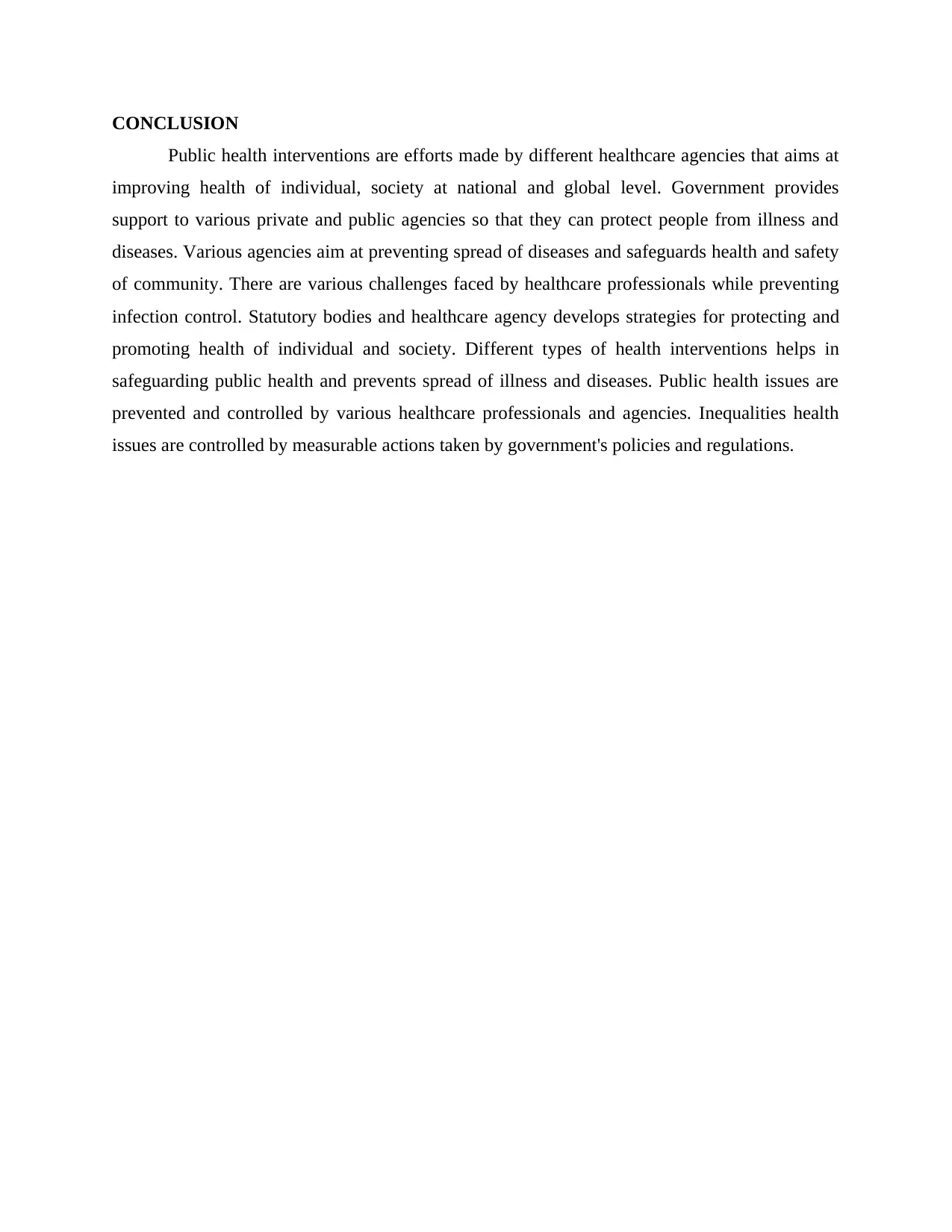
CONCLUSION
Public health interventions are efforts made by different healthcare agencies that aims at
improving health of individual, society at national and global level. Government provides
support to various private and public agencies so that they can protect people from illness and
diseases. Various agencies aim at preventing spread of diseases and safeguards health and safety
of community. There are various challenges faced by healthcare professionals while preventing
infection control. Statutory bodies and healthcare agency develops strategies for protecting and
promoting health of individual and society. Different types of health interventions helps in
safeguarding public health and prevents spread of illness and diseases. Public health issues are
prevented and controlled by various healthcare professionals and agencies. Inequalities health
issues are controlled by measurable actions taken by government's policies and regulations.
Public health interventions are efforts made by different healthcare agencies that aims at
improving health of individual, society at national and global level. Government provides
support to various private and public agencies so that they can protect people from illness and
diseases. Various agencies aim at preventing spread of diseases and safeguards health and safety
of community. There are various challenges faced by healthcare professionals while preventing
infection control. Statutory bodies and healthcare agency develops strategies for protecting and
promoting health of individual and society. Different types of health interventions helps in
safeguarding public health and prevents spread of illness and diseases. Public health issues are
prevented and controlled by various healthcare professionals and agencies. Inequalities health
issues are controlled by measurable actions taken by government's policies and regulations.
⊘ This is a preview!⊘
Do you want full access?
Subscribe today to unlock all pages.

Trusted by 1+ million students worldwide
1 out of 13
Related Documents
Your All-in-One AI-Powered Toolkit for Academic Success.
+13062052269
info@desklib.com
Available 24*7 on WhatsApp / Email
![[object Object]](/_next/static/media/star-bottom.7253800d.svg)
Unlock your academic potential
Copyright © 2020–2026 A2Z Services. All Rights Reserved. Developed and managed by ZUCOL.




